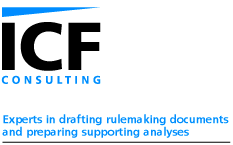|
Specific Analyses for Steps Three and Seven
|
|---|
|
Regulatory Planning and Review (E.O. 12866)
|
|
Regulatory Flexibility Act (5 U.S.C. 601-612)
involving internal revenue laws (5 U.S.C. 603, 604). |
|
Paperwork Reduction Act (44 U.S.C. 3501-3520)
|
|
Unfunded Mandates Reform Act (2 U.S.C. Chs. 17A, 25)
|
|
Federalism (E.O. 13132)
|
|
Indian Tribal Governments (E.O. 13175)
|
|
National Environmental Policy Act (42 U.S.C. 4321-4347)
|
|
National Technology Transfer and Advancement Act (15 U.S.C. 272 note)
|
|
Governmental Actions and Interference with
Constitutionally Protected Property Rights (E.O. 12630)
|
|
Protection of Children from Environmental Health Risks and Safety Risks (E.O. 13045)
|
|
Actions Concerning Regulations That Significantly Affect
Energy Supply, Distribution, or Use (E.O. 13211)
|
|
Drafting Requirements for Rulemaking Documents
|
|---|
|
Regulatory Planning and Review (E.O. 12866)
Rulemaking documents must comply with the specified regulatory philosophy and principles of regulation.
|
|
Civil Justice Reform
Rulemaking documents must be written in clear language designed to help reduce litigation.
(E.O. 12988) |
|
Presidential Memorandum on Plain Language
Rulemaking documents must comply with plain language principles.
(63 FR 31885) |
|
Federal Register
Rulemaking documents must comply with the Federal Register regulations (1 CFR). Additional guidance and requirements are contained in the Federal Register's Document Drafting Handbook.
Publications |
|
Agendas for Rules Under Development or Review
|
|---|
|
Unified Regulatory Agenda
The Unified Regulatory Agenda provides information concerning agency rules under development
or review.The Unified Regulatory Agenda is published in the Federal Register in the spring and fall of each year. |
|
Regulatory Plan
The Regulatory Plan provides information concerning the most important significant regulatory actions that the agency is planning to take.The Regulatory Plan is published in the Unified Regulatory Agenda in the fall of each year. |
|
Regulatory Flexibility Agenda
The Regulatory Flexibility Agenda provides information concerning any rule that an agency expects to prepare or promulgate that is likely to have a significant economic impact on a substantial number of small entities.Agency regulatory flexibility agendas are published as part of the Unified Regulatory Agenda in the spring and fall of each year. |
